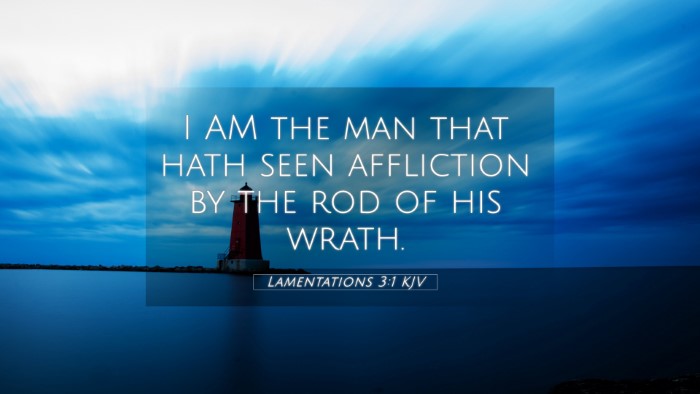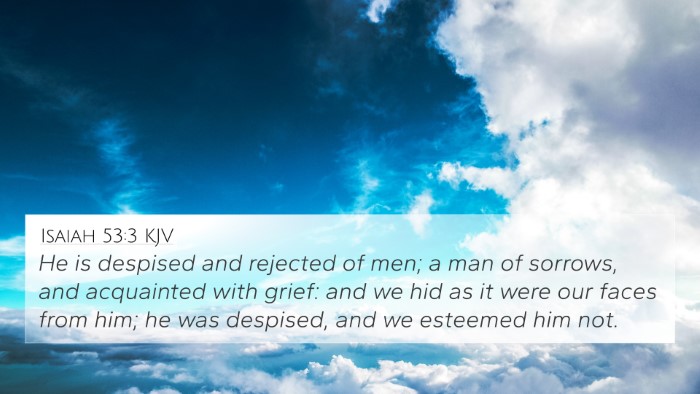Understanding Lamentations 3:1
Lamentations 3:1 states, "I am the man who has seen affliction by the rod of his wrath." This verse encapsulates the profound sorrow and desolation experienced by the prophet Jeremiah as he reflects on the destruction of Jerusalem and the suffering of its people. The lament here is deeply personal and illustrates the intensity of grief felt by one who has witnessed calamity.
Commentaries by Matthew Henry, Albert Barnes, and Adam Clarke provide rich insights into the meaning of this verse, highlighting various theological and emotional aspects, which are essential for a comprehensive understanding.
Insights from Public Domain Commentaries
-
Matthew Henry:
Henry emphasizes the personal nature of this lament. He describes the "man" as an individual representing the collective grief of the people. The "affliction" he speaks of is multifaceted—spiritual, emotional, and physical. Henry notes that the "rod of his wrath" signifies divine discipline, indicating that the suffering was a result of turning away from God’s commands. This reflection provokes self-examination and calls for repentance among the Israelites.
-
Albert Barnes:
Barnes provides a contextual analysis of this verse within the framework of Judah’s captivity. He correlates the afflictions mentioned with the consequences of sin and disobedience. Barnes highlights that Jeremiah, witnessing the consequences of national sin, personally feels the weight of this judgment. He argues that such suffering serves as a call to acknowledge one's sins and seek reconciliation with God, which resonates with the principle of divine justice.
-
Adam Clarke:
Clarke draws a deeper emotional portrait of Jeremiah’s experience, suggesting an identification with the suffering of his nation. He elaborates on the psychological impact of witnessing suffering, highlighting that the "rod of his wrath" is not merely punitive, but also corrective. Clarke’s interpretation underlines the themes of hope amidst despair, reminding readers that genuine lament can lead to restoration.
Thematic Cross-References
Lamentations 3:1 is tightly woven into the fabric of biblical themes of suffering, repentance, and divine justice. Below are essential Bible verse cross-references that connect with this verse:
- Psalm 119:67: "Before I was afflicted I went astray: but now have I kept your word."
- Isaiah 53:4: "Surely he has borne our griefs and carried our sorrows; yet we esteemed him stricken, smitten by God, and afflicted."
- Jeremiah 10:19: "Woe is me for my hurt! My wound is severe. But I say, 'Truly this is an infirmity, and I must bear it.'"
- Hebrews 12:6: "For the Lord disciplines the one he loves, and chastises every son whom he receives."
- 2 Corinthians 12:10: "For the sake of Christ, then, I am content with weaknesses, insults, hardships, persecutions, and calamities. For when I am weak, then I am strong."
- 1 Peter 5:10: "And after you have suffered a little while, the God of all grace, who has called you to his eternal glory in Christ, will himself restore, confirm, strengthen, and establish you."
- Romans 5:3-4: "Not only that, but we rejoice in our sufferings, knowing that suffering produces endurance, and endurance produces character, and character produces hope."
Connecting Themes and Cross-Referencing
Recognizing connections between Bible verses enhances our understanding of biblical texts. The emotional despair Jeremiah expresses in Lamentations 3:1 is a recurring theme found throughout scripture. By employing a Bible concordance or using a Bible cross-reference guide, one can delve into the connections between verses that examine suffering and divine discipline. Here are a few thoughts on how to utilize these tools effectively:
-
Using a Bible Concordance:
A Bible concordance can help identify key themes and verses related to suffering and repentance, illustrating the continuity of these messages throughout scripture.
-
Exploring Cross-Reference Bible Study:
Engage in cross-referencing Bible study methods to uncover parallels between Lamentations and other biblical accounts of restoration and hope in times of trouble.
-
Thematic Bible Verse Connections:
Identify and analyze thematic connections such as God's wrath, discipline, and the eventual hope for restoration found in passages like Isaiah and Hebrews.
Conclusion
Lamentations 3:1 serves as a poignant reminder of the human condition in the face of suffering and the reality of God’s sovereignty over affliction. Through a comparative Bible verse analysis, we can see how this lament resonates with other scriptures, offering a profound depth to our understanding. The exploration of cross-references enriches our interpretation, guiding us towards a greater comprehension of God’s purposes in our suffering and the hope of restoration that echoes throughout the biblical narrative.











